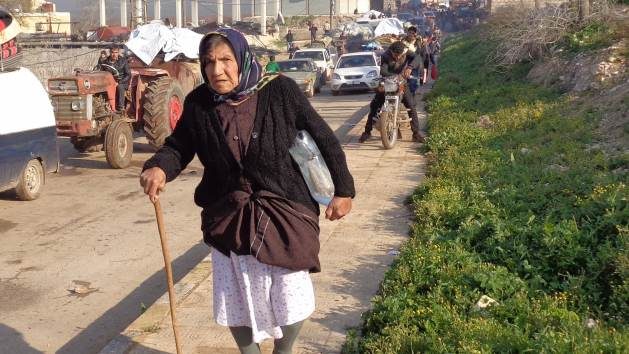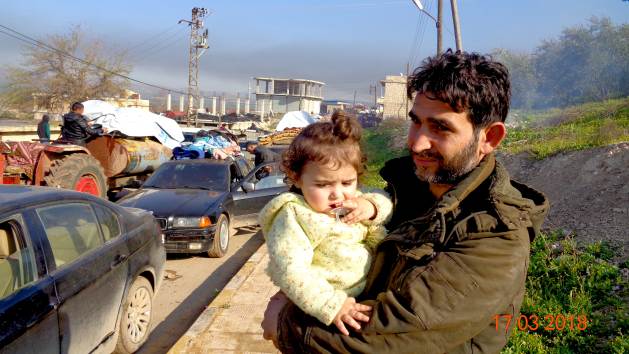In Northern Syria, Palestinians Finance Settlements in Kurdish-Occupied Areas

ROME, Jul 18 (IPS) - The video shows an empty house with even the door frames and windows torn out. Graffiti on the wall recalls that the building was once requisitioned by the Sham Legion, an Islamist faction from northern Syria.
“I was very curious so I asked a relative to send me the video to see what state our house was in,” Hassan Hassan told IPS by phone. This 50-year-old English teacher lived there with his family before they were expelled in 2018.
Today he lives with his family in Shehba, a Kurdish region 30 kilometers to the east that has welcomed thousands of displaced people.
The Syrian Kurdish enclave of Afrin - 300 kilometers north of Damascus - was a Kurdish-majority territory bordering Turkey that enjoyed self-government.
In January 2018, Turkey launched Operation Olive Branch, a cross-border attack through which Ankara gave air support to Islamist militias on the ground.
The offensive caused the displacement of more than 150,000 people - almost 80% of the population of Afrin - according to UN data, as well as a chain of abuses and human rights violations.
During the siege, the Hassans barely had time to flee. "We were 19 Kurdish families living in that block, but we lost everything: our books, our photos, memories... Of course, we also lost the right to claim our property," recalls the Kurd.

The reasons can be found in a report published in June 2022 by Syrians for Truth and Justice. The France-based NGO which documents human rights violations in Syria points to an ambitious settlement project that kicked off in 2020.
According to the investigation, the project is commanded by Rahmi Do?an —governor of the Turkish border province of Hatay— and financed by organizations from several countries in the Middle East. The beneficiaries are Islamist combatants and ex-combatants and their respective families.
The NGO has found "indicators of demographic change" and draws a parallel with displacement and resettlement in East Timor after Indonesia invaded the territory in 1975.
David M. Mañá, a Spanish journalist specializing in the Kurdish issue, recalls that barely 20% of the original Kurdish population remains in Afrin. He points to “a forced repopulation campaign" moving displaced Arabs from the rest of Syria into the enclave.
“It´s not just about expelling the local Kurdish population; they also want to erase all traces of their language or self-government. Today the Turkish flag is flown even in schools where Kurdish is no longer taught, but Turkish is," the expert told IPS, by phone from Barcelona.
Access to the Kurdish enclave remains under the exclusive control of the Turkish Interior Ministry. In February, 2022 and 2023, the Turkish authorities organized two tours for reporters who worked under the constant surveillance of government agents.
According to data obtained by the North Press Agency —a media outlet in northeastern Syria —the more than 20 settlements built in Afrin add to approximately 100 that Turkey has built throughout the occupied areas of northern Syria.
“We Kurds cannot and do not want to live under the control of these people. We only ask to return to our homes, but that will never be possible without an international protection that guarantees our safety," Ibrahim Shekho, the president of the Afrin Human Rights Organization, told IPS over the phone from the Shehba refugee camp.
Shekho said he is not surprised by the presence of countries like Kuwait, Qatar or Oman behind the project. The Palestinian involvement is something else.
"I cannot understand that there are Palestinians who are able to forget the injustice they suffer at the hands of the Israeli authorities and wish the same to us," he lamented.
Palestinian involvement
Living with Dignity is one among several Palestinian NGOs legally registered at Israel's Ministry of Justice. They also introduce themselves as Alaysh 48 (“People of 48”), recalling that they are Palestinian citizens of Israel who reject the country's borders established in 1948.
On its Facebook page, they claim to be raising funds for Syrian settlements through Hapoalim Bank. It is a financial entity known for channelling money for the construction of settlements in Palestinian territory. They have a branch in the settlement of Ariel.
According to documentation from the Israeli Ministry of Justice examined by IPS, it was in November 2019 when Living with Dignity contacted Turkish organizations "to help Syrian refugees in Turkey." Their first project included the construction of 112 apartments and 10 mosques in Afrin in 2021.
Since then, they have not stopped raising funds for similar settlements in the region.
The last one that they have co-financed is that of Shadere, which opened last May. What remains of its original Yezidi population has been forced into an Islamic education by the Islamist factions controlling the area.
Initially, Shaikh Sallam, an executive member of Living with Dignity, agreed to answer questions from IPS, but he ended up declining the invitation.
However, Living with Dignity is not the only Palestinian-run NGO involved in settlement construction in northern Syria.
Ajnadin, an NGO which has its headquarters in Bayt Hanina — an occupied district in east Jerusalem —is behind several projects, such as the Adjanin Palestinesettlement, opened last January.
On their website, Albairaq -another Palestinian NGO- also claims to be raising money for the programme. IPS contacted Rashad Wattad, an executive member of Albairaq .
"The only aid we have provided to Syrian refugees was after the earthquake and includes food for tents and other basic humanitarian aid," the Palestinian explained over the phone from the Triangle, a cluster of Arab towns adjacent to the Green Line separating pre-1967 Israel from the Occupied Palestinian Territories,
Asked about the settlements in Syria mentioned in their own reports, Wattad admitted that they had been built in collaboration with Living with Dignity. "They have access to the area,” Wattad clarified.
The Palestinian refused to disclose the number of houses built and still in the pipeline. He said he did not see any contradiction in supporting a settlement program similar to the one his people suffer on their own land.
"We just want to help the people," said Wattad.
Wafa Al-Muhsinin is an Istanbul-based Palestinian organization involved in the Al Zaim settlement. It owes its name to a Palestinian town occupied in 1967.
It opened last year in Jindires, very close to that empty house that appears in the video sent to Hassan Hassan.
“They told us that a family from Idlib (northwestern Syria) had settled in our house, but that they later moved to a settlement after the earthquake. It is still standing, but it is damaged and it is no longer safe”, said the Kurdish man.
Jindires settlement was one of the points mentioned in a letter that Kurds from Afrin sent to Nazmi Hazouri, the Palestinian consul in the Kurdish Autonomous Region of Iraq.
"The word 'settlement' horrifies us, and we categorically reject the construction of any in our name," Hazouri told Kurdish journalists.
Meanwhile, the human flow is directed through northern Syria through a concrete riverbed.
Hassan Hassan is reluctant to rule out going back to Afrin in the future, but he prefers to be realistic. In Shehba the danger is constant and he fears going through the same thing again.
“We´ll have to leave again, that´s our only certainty.”
© Inter Press Service (2023) — All Rights Reserved. Original source: Inter Press Service
Where next?
Browse related news topics:
Read the latest news stories:
- African Diaspora Exhibition Showcases Transformative Solidarity and the Legacy of Slavery Wednesday, March 26, 2025
- A Chance for Sisi to Follow Sadat's Vision and Courage Wednesday, March 26, 2025
- Will UN be a Possible Target as US Goes on a Rampage? Wednesday, March 26, 2025
- Malnutrition Not Due to Cash Poverty Alone Wednesday, March 26, 2025
- Can renewable energy survive climate change? Wednesday, March 26, 2025
- Empowering Women in Agriculture: Breaking Barriers for a Thriving Future Tuesday, March 25, 2025
- Royalties, a New Indigenous Right for Hydroelectric Damages in Brazil Tuesday, March 25, 2025
- Young Women in Afghanistan Driven to Suicide Amid Widespread Frustration Tuesday, March 25, 2025
- Strengthening Indigenous Peoples and Local Communities’ Knowledge and Access Opens up Opportunities for Climate, Biodiversity and Desertification Action Tuesday, March 25, 2025
- The Ocean Creeps In: Tanzanian Coastal Communities Fight a Losing Battle Tuesday, March 25, 2025
Learn more about the related issues: